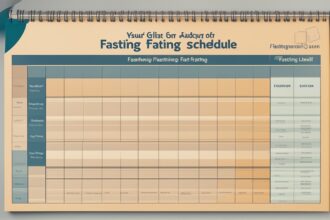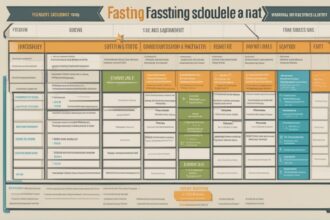Intermittent fasting (IF) has gained immense popularity as a flexible and effective approach to weight management, improved metabolic health, and overall wellness. For those new to this lifestyle, navigating the world of fasting schedules can feel overwhelming. That’s why we’ve put together this comprehensive guide with beginner tips for intermittent timing. Whether you’re looking to dip your toes into fasting or establish a sustainable routine, these actionable insights will help you start strong and stay consistent.
What Is Intermittent Fasting and Why Try It?
Intermittent fasting is not a diet but a pattern of eating that alternates between periods of eating and fasting. Unlike traditional diets that focus on what you eat, IF emphasizes when you eat. Popular methods include the 16/8 method (fasting for 16 hours and eating during an 8-hour window) and the 5:2 approach (eating normally for 5 days and restricting calories on 2 days). Research suggests that IF can support weight loss, enhance insulin sensitivity, and even promote cellular repair.
For beginners, understanding the basics of intermittent timing is crucial. It’s not about starvation but rather about giving your body a break from constant digestion. Starting with a manageable fasting window can help ease the transition and set you up for long-term success.
Choosing the Right Fasting Schedule for Beginners
One of the most important beginner tips for intermittent timing is selecting a schedule that aligns with your lifestyle. Jumping into an advanced fasting protocol like a 24-hour fast can be discouraging if you’re not prepared. Instead, start with a beginner-friendly approach like the 12/12 method, which involves fasting for 12 hours (often overnight) and eating during the remaining 12 hours. This can be as simple as finishing dinner by 7 PM and not eating again until 7 AM the next day.
Once you’re comfortable, you can progress to the 16/8 method, which is widely regarded as sustainable for most people. The key is to experiment and find a rhythm that doesn’t disrupt your daily routine. Remember, consistency matters more than intensity when you’re just starting out. For more on different fasting protocols, check out our detailed guide on types of intermittent fasting.
Timing Your Meals for Maximum Benefit
Intermittent timing isn’t just about when you fast—it’s also about when you eat. A common mistake among beginners is not planning meals within the eating window, leading to overeating or poor food choices. To avoid this, aim to break your fast with a balanced meal that includes protein, healthy fats, and complex carbohydrates. This helps stabilize blood sugar levels and keeps hunger at bay.
Another tip is to align your eating window with your most active hours. If you’re a morning person, an earlier eating window (e.g., 10 AM to 6 PM) might work best. If you’re more active in the evenings, consider a later window (e.g., 2 PM to 10 PM). Timing your meals strategically can enhance energy levels and make fasting feel less restrictive. Curious about meal planning during IF? Explore our post on meal planning for fasting.
Managing Hunger and Cravings as a Beginner
Feeling hungry or experiencing cravings is normal when you start intermittent fasting, especially if your body is used to frequent meals or snacks. One of the best beginner tips for intermittent timing is to stay hydrated. Drinking water, herbal tea, or black coffee during fasting hours can help curb appetite and keep you focused. Adding a pinch of salt to your water can also replenish electrolytes, especially if you feel lightheaded.
Another strategy is to keep busy during fasting periods. Engage in light activities like walking, reading, or meditation to distract yourself from hunger. If cravings persist, remind yourself that they often pass within 20–30 minutes. Over time, your body will adapt to the new eating pattern, and hunger pangs will lessen. For additional strategies, read our article on managing hunger during fasting.
Listening to Your Body and Adjusting Timings
While following a fasting schedule is important, it’s equally critical to pay attention to how your body responds. Not every day will feel the same—stress, sleep quality, and activity levels can influence how you feel during a fast. If you’re feeling overly fatigued or irritable, it might be a sign to shorten your fasting window or take a break for a day.
Flexibility is key when it comes to intermittent timing for beginners. Don’t be afraid to adjust your schedule based on your needs. For instance, if a social event falls outside your usual eating window, it’s okay to shift your timing temporarily. The goal is to make IF a sustainable part of your life, not a rigid set of rules. Learn more about personalizing your fasting journey in our guide to customizing fasting schedules.
Common Mistakes to Avoid with Intermittent Timing
As a beginner, it’s easy to fall into common traps that can derail your fasting efforts. One mistake is starting with an overly aggressive schedule. Fasting for too long too soon can lead to burnout or binge eating during your eating window. Instead, ease into it gradually, increasing your fasting hours as your body adapts.
Another pitfall is neglecting nutrition. Fasting doesn’t give you a free pass to eat unhealthy foods during your eating window. Focus on nutrient-dense meals to support your health goals. Lastly, avoid ignoring hydration and rest—both are essential for a successful fasting experience. For a deeper dive into avoiding pitfalls, see our post on common fasting mistakes.
Disclaimer: The information provided in this article is for educational purposes only and should not be considered medical advice. Intermittent fasting may not be suitable for everyone, including pregnant or breastfeeding individuals, those with certain medical conditions, or people with a history of eating disorders. Always consult with a healthcare professional before starting any new dietary or fasting regimen to ensure it is safe and appropriate for your individual needs.
References
- Harvard Health Publishing – Intermittent Fasting: Surprising Update
- Mayo Clinic – Intermittent Fasting: What You Need to Know
- National Institutes of Health – Effects of Intermittent Fasting on Health and Aging
- WebMD – Intermittent Fasting Overview
- Johns Hopkins Medicine – Intermittent Fasting: What Is It, and How Does It Work?
This content is for informational purposes only and not a substitute for professional advice.






